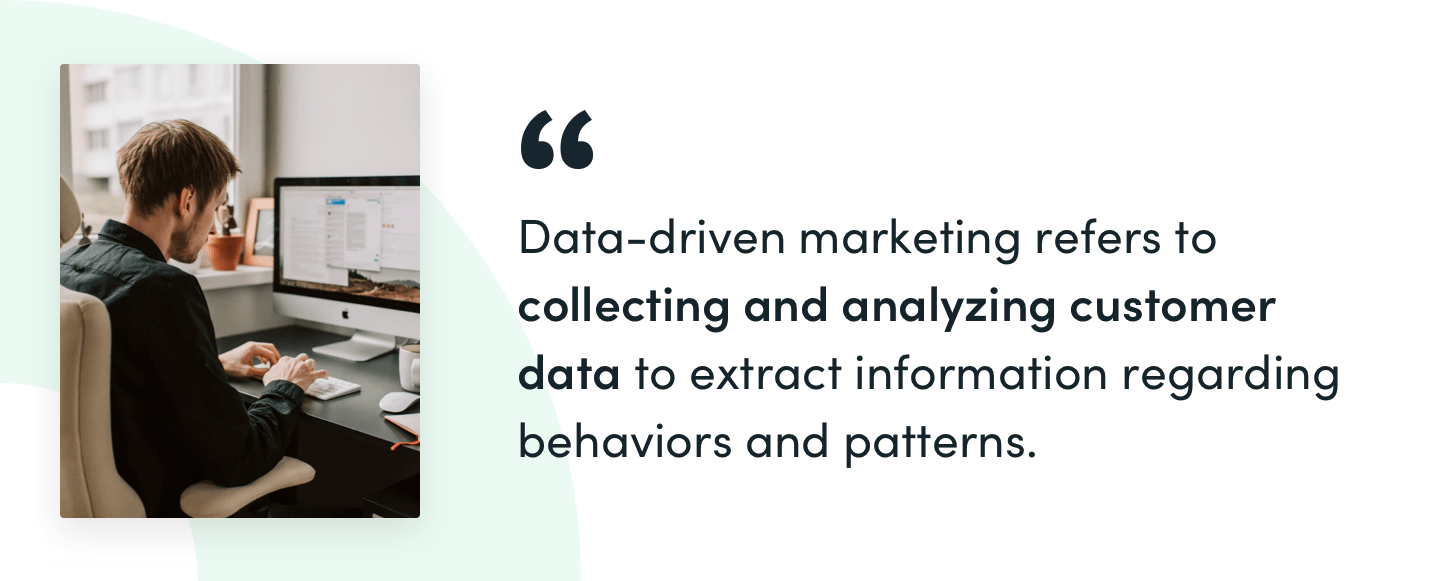The marketing scene is changing rapidly as marketers try to capture accurate customer behavior and patterns at various funnel stages in their marketing campaigns. Thanks to robust technologies and data-driven tools, it's easier for businesses to reach their target market en-mass.
Data-driven marketing can offer you the complete picture of your consumers' needs and preferences. Good marketing now is all about how effectively businesses and marketers can utilize their data. There is absolutely no excuse for not knowing what your leads, prospects, and customers want from your business. Using data-driven marketing is a great way to understand their needs for the benefit of your business.
Let's find out why knowing customer behaviors and patterns is essential for marketing and the different ways that businesses can develop data-driven marketing campaigns.
What do you mean by data-driven marketing?
Data-driven marketing refers to collecting and analyzing customer data to extract information regarding behaviors and patterns. The resulting info can help predict customer behaviors with brands that they interact with. As big data and AI become a need for businesses, it's becoming possible to extract massive amounts of information about customers and create personalized customer experiences.

Clients want brands to understand their preferences and get immediate results. Modern marketers understand this need for personalization and know that it takes more than gut instinct and risk to win customers.
Here are a few ways businesses can make targeted marketing campaigns and understand consumer behavior:
Use Cloud-Based Collaboration Tools
Data is essential to all businesses to understand customer behavior and measure different approaches to consumer marketing. However, it alone cannot help companies nail a marketing campaign unless it is used along with collaborative tools to provide valuable insights on this data.
For example, customer relationship management (CRM) platforms collect customer interactions along their journey in one centralized location. This can help marketers understand how consumers interact with the brand on different social media channels and create campaigns that align with their journey. Similarly, companies can also use cloud-based analytics and data to understand consumers' past purchase history and predict what they'll buy in the future.
The best aspect of cloud-based tools is that every department can share the information, giving everyone access to resources that are key to making informed decisions.
Making marketing decisions through data-driven tools will not only lead to a long-standing relationship with customers but will also help you boost sales. Just make sure that your collaboration tools come with critical features, including transparency, ease of use, and simplifying complex data and information.
Related: The 41 Most Popular No-Code Tools
Create Personalized Email Campaigns
Ever since most businesses and brands have started operating online, more consumers are looking for personalized experiences. They want brands to form a genuine connection with them and get to know about their preferences. According to research, 82% of marketers found that personalized emails had a higher open rate, while nearly half of all consumers purchased a product only because they received a personalized recommendation.
With carefully collected data from data-analytic tools, marketers can better understand how to send tailored emails and messages to strike a chord with the audience and encourage positive engagement. These personalized emails also save considerable time by segmenting your consumers into groups and sending targeted emails to each set at one time.
You can create personalized emails in several ways, such as:
- Using customized subject lines
- Sending product recommendations based on past purchase history
- Using dynamic imagery and graphics in your emails to better appeal to specific subscribers
- Sending exclusive offers and discounts to loyal customers

Create Personalized Ads
Data tracking analytics and tools afford marketers valuable insights into web cookies and personal data shared by users online. They can then put this goldmine to use by developing tailored solutions to their individual needs.
Also, digital targeting can improve ad performance on websites since marketers can create specifically targeted ads that are suited to consumers' preferences. These highly-specific ads can increase click-through rates since marketers know who is on the receiving end and thus create ads accordingly.
This will not only increase website traffic but also help generate additional revenue. You can collect revenue from your website via personalized ads, personal product recommendations, and sponsored posts.
Predict Behavior With Comprehensive Forecasting
As data-driven marketing strategies rise, marketers are increasingly using these techniques to leverage a new marketing tool: predictive analytics. Predictive analytics allows businesses to stay ahead of the competition by analyzing consumer trends and predicting future shifts in their shopping patterns and behavior.
This is done by combining data sets generated through various algorithms and running them through AI and machine learning platforms to develop more effective and dynamic campaigns. Creating personalized campaigns won't just enhance customer experiences but will also boost sales and ROI.
Conclusion
Considering the ever-changing world of marketing, marketers and business owners should always strive to remain competitive by looking for new methods to make their campaigns more effective.
Most marketers now leverage big data analysis to stay ahead of the competition. Take the time to research market trends, explore consumer preferences and figure out creative ways to add more touchpoints to your campaigns.
Hopefully, the techniques mentioned above can help you kick start your data-driven marketing plan to make targeted measurements and analysis.
About the Author

Nahla Davies is from Brooklyn, New York. Since 2015, she has worked with enterprise clients around the world developing RegTech protocols and best practices. She shares her insights at nahlawrites.com. Follow Nahla on LinkedIn.












